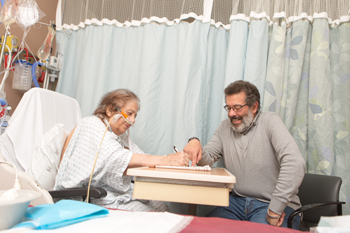Preventing delirium with an activity box

By Evelyne Jhung

Nadia Gorgi sits up and does a crossword with her son, Adel Shoucri, in the Cardiology Unit while recovering from a stay in the Medical Surgical Intensive Care Unit. Keeping her mind active is a non-pharmacological strategy recommended by her MSICU team to help prevent the return of delirium. (Photo by Yuri Markarov)
When Nadia Gorgi was in the Medical Surgical Intensive Care Unit, she was on a host of medications and was having many procedures and tests done – all of which contributed to her delirium.
“She was confused, she didn’t know night from day and she wasn’t herself – she threw things and kept trying to pull out her tubes,” said her son Adel Shoucri.
As ICU patients are at extremely high risk of developing delirium, the MSICU team came up with the idea of creating an activity box to help occupy its patients.
“We felt like the medical side of managing delirium was already well dealt with, so we wanted to focus on a non-pharmacological solution,” said Melissa Guiyab, a clinical nurse specialist in the MSICU.
The activity box is similar to the activity cart used on the Acute Care for the Elderly unit and includes crosswords, playing cards, donated iPads, Wii games, headphones, and eye masks and earplugs to help patients sleep at night. Either a staff member will suggest an activity to the patient or let visitors know about the box so they can use it together.
Did you know? The MSICU team of Melissa Guiyab, a clinical nurse specialist; Jennifer Martin, a registered nurse; Deanna Feltracco, a physiotherapist; Shannon Swift, a clinical nurse educator; Christine Lee, a social worker; Prafulla Savedra, a resource nurse; and Johanna Proceviat, a pharmacist, won the 2016 SOAPEE grant for its project, “nonpharmacological delirium prevention and management in the MSICU” and presented its findings at the 2017 REID event in October. |
“For our patients who are awake, mobility is an issue,” said Deanna Feltracco, a physiotherapist. “Lying in the MSICU all day, they might not know night from day, so these activities are intended to try to get them back into their regular routine and occupy their mind.”
Once Gorgi started coming out of her delirium, the team worked with Shoucri to find out what activities his mother enjoyed. Now she sits up and does crosswords or plays other games on an iPad.
“We’re trying to keep these patients as active as possible and on a regular schedule to prevent delirium or any future episodes,” said Jennifer Martin, a registered nurse in the MSICU. “Non-pharmacological strategies are just as important as managing medications to prevent and manage delirium, especially in intensive care units where the risk of delirium is high.”
About St. Michael’s Hospital
St. Michael’s Hospital provides compassionate care to all who enter its doors. The hospital also provides outstanding medical education to future health care professionals in more than 29 academic disciplines. Critical care and trauma, heart disease, neurosurgery, diabetes, cancer care, care of the homeless and global health are among the Hospital’s recognized areas of expertise. Through the Keenan Research Centre and the Li Ka Shing International Healthcare Education Centre, which make up the Li Ka Shing Knowledge Institute, research and education at St. Michael’s Hospital are recognized and make an impact around the world. Founded in 1892, the hospital is fully affiliated with the University of Toronto.
